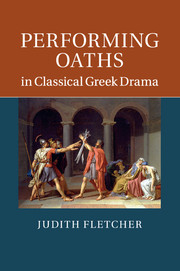Book contents
- Frontmatter
- Contents
- Acknowledgments
- A note on abbreviations
- Introduction
- Chapter 1 From curses to blessings: horkos in the Oresteia
- Chapter 2 Speaking like a man: oaths in Sophocles’ Trachiniae and Philoctetes
- Chapter 3 Horkos in the polis: Athens, Thebes and Sophocles
- Chapter 4 Perjury and other perversions: Euripides’ Phoenissae, Orestes and Cyclops
- Chapter 5 Twisted justice in Aristophanes’ Clouds
- Chapter 6 Women and oaths in Euripides
- Chapter 7 How to do things with Euripides: Aristophanes’ Thesmophoriazusae
- Chapter 8 Swearing off sex: the women's oath in Aristophanes’ Lysistrata
- Conclusion
- Bibliography
- Index locorum
- General index
Chapter 5 - Twisted justice in Aristophanes’ Clouds
Published online by Cambridge University Press: 05 December 2011
- Frontmatter
- Contents
- Acknowledgments
- A note on abbreviations
- Introduction
- Chapter 1 From curses to blessings: horkos in the Oresteia
- Chapter 2 Speaking like a man: oaths in Sophocles’ Trachiniae and Philoctetes
- Chapter 3 Horkos in the polis: Athens, Thebes and Sophocles
- Chapter 4 Perjury and other perversions: Euripides’ Phoenissae, Orestes and Cyclops
- Chapter 5 Twisted justice in Aristophanes’ Clouds
- Chapter 6 Women and oaths in Euripides
- Chapter 7 How to do things with Euripides: Aristophanes’ Thesmophoriazusae
- Chapter 8 Swearing off sex: the women's oath in Aristophanes’ Lysistrata
- Conclusion
- Bibliography
- Index locorum
- General index
Summary
In Greek thought dikê is a balanced system of reciprocity, “equal value rendered for value taken,” as Gregory Vlastos put it. In a society whose members were always acutely aware of their own positions within a meticulously defined system of reciprocity, every action could be mapped onto the landscape of justice. And the term “landscape” is no empty metaphor here. From the Greek perspective justice was, at its most fundamental, intimately connected with the natural world. Solon could speak of a calm sea as “most just” (fr. 12W) because it does not disturb its surroundings. Nature not only exhibits justice, but also enforces it. A Homeric simile, for example, tells how Zeus uses the weather to respond to injustice:
As the whole dark earth is drenched by a storm on an autumn day, when Zeus pours down the most violent rain, in furious anger (σκολιὰς κρίνωσι θέμιστας) at men who force though crooked judgments in the assembly and drive out justice, with no regard for the vengeful gaze of the gods.
(Il. 16.384–8)As this simile suggests, aberrations of justice are crooked. Justice is correspondingly “straight”; Homer describes judges who reward “the straightest judgment” (δίκην ἰθύντατα εἴποι, Il. 18.507–8). The ambition of Strepsiades, comic hero of Aristophanes’ Clouds, is to “twist justice” (στρεψοδικῆσαι, 434) to elude his creditors: a desire signified by a name cognate with the verb strephein “to twist.” Strepsiades is an unusual protagonist, who seems to have one foot in tragedy, but then Clouds is an unusual specimen of Old Comedy. The surviving version was probably never produced in fifth-century Athens, and is an incomplete revision of a production that placed third at the City Dionysia in 423 bce. Whether the poet meant the second version to be read and circulated is another possibility, but the question of how it came to survive while only twelve fragments of the staged version remain cannot be answered. The comedy as we have it represents an interesting, perhaps experimental, foray into themes of hubris and retribution more familiar from tragedy than comedy. Like Euripides’ Medea and Phoenissae, Clouds treats the dark topic of perjury.
- Type
- Chapter
- Information
- Performing Oaths in Classical Greek Drama , pp. 158 - 176Publisher: Cambridge University PressPrint publication year: 2011



